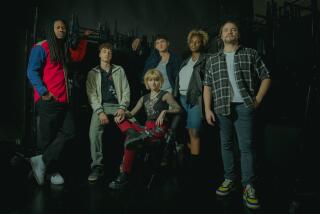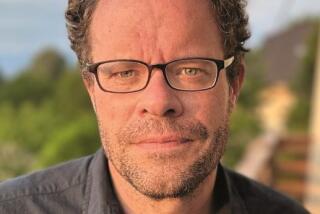Television Reviews : ‘Hands Untied’ Examines State of Hearing-Impaired
- Share via
“Hands Untied,” airing tonight at 7:30 on Channel 2, is a moving half-hour look at the status of the deaf and hearing-impaired community in the 1980s. And, to better serve that community, KCBS takes the unusual step of broadcasting the program with subtitles and American Sign Language as well as the spoken word.
“Hands” begins with a look at the student rebellion last March at Gallaudet University in Washington, the nation’s only liberal arts college for the deaf. Co-producer/host Valerie Coleman equates the successful nonviolent student protest to remove a newly appointed non-hearing-impaired president in favor of a deaf president to the civil rights triumphs of the 1950s and ‘60s. Coleman, who speaks as well as signs her part, sees the events at Gallaudet as a watershed for the deaf, the beginning of a “quiet revolution.”
The program relies heavily on interviews with a range of deaf and hearing-impaired persons, including I. King Jordan, the new Gallaudet president who is also the first deaf leader of the 124-year-old school; Tony Award-winning actress Phyllis Frelich, and leaders of the deaf community.
Coleman wisely lets them do the brunt of the talking and here is where “Hands” is at its best: The understated outpouring of emotion and the plainly told stories of discrimination, thoughtless and deliberate cruelties, and painful experiences are affecting.
Coleman makes a strong case for the use of sign language, calling it “the native language” of the deaf--Jordan says simply that “deaf children have to see language.” Coleman also argues that mainstreaming deaf students into hearing classrooms is detrimental to the students. Unfortunately, she has stacked the deck: No dissenting opinions are heard and, in the case of mainstreaming, no alternatives other than special schools for the deaf are mentioned.
This is a major flaw, making “Hands” more advocacy than documentary. Nevertheless, as Gallaudet President Jordan says, there are attitudinal and educational barriers to be broken down. “Hands Untied” takes a step in that direction with an eloquent anti-discrimination message that needs to be heard.
More to Read
The complete guide to home viewing
Get Screen Gab for everything about the TV shows and streaming movies everyone’s talking about.
You may occasionally receive promotional content from the Los Angeles Times.






